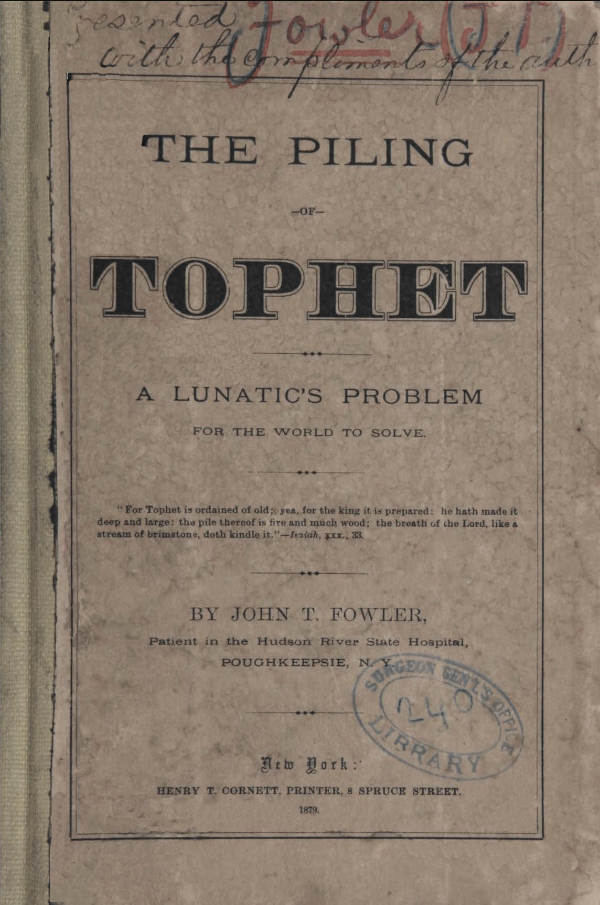The quotes below are from John Fowler’s 1879 autobiography, The Piling of Tophet, except for the final one, which is from his short work The Lying Deceitfulness of Anti-Lunacy, also published in 1879.
Distress in Hempstead:
“When my state of hopeless entanglement and writhing, agonized perplexity was at its height I heard the voice of Mrs. Pettit, “Oh! the poor thing can’t see that he’s mad!” the comment falling upon the scene of gloom in a way that increased my confusion rather than consoled. All my feelings and thoughts appeared to be thus overlooked by those near and maliciously taken advantage of. It seems to me that this is a species of torment that the poets of the classical age never chanced upon in their delineations of Tartarus.”
Flight from Hempstead:
“I heard of the Poughkeepsie Asylum for the first time when I was told that I was to be sent there. I had some anticipation that after I reached the asylum I might succeed in getting the medical authorities to give serious attention to my representations — possibly convince them that I was not deluded, and get things put on their true foundation…On Friday afternoon I got so excessively irritated that I was certain I could not stand it four days longer without losing command of myself, and just at dusk I suddenly resolved to escape from my besetting troubles by flight. I started off on the instant, declaring that I shook off the dust of my feet against the place, and in a few minutes I was making my way across the plains, with the village low down upon the horizon behind me.”
Traveling to the hospital in Poughkeepsie:
“In passing through New York City in a street-car it appeared to me that every one I heard talking shifted the subject as soon as I fixed my attention on him to “He set that whole village against him by his constant monotonous whistling.” The whistling of every street-boy, and the shrill whistles which I heard blown at every turn, struck upon my lacerated nerves most painfully. Perhaps midway of the trip, or later, a plainly-dressed woman of middle age entered the car. Room was made for her on my side of the car, but she refused to take the seat, saying “I am afraid it might incommode that young gentleman there,” pointing to me. She stood and seemed to regard me benevolently. Whatever the magnetism of her manner may have been, from that moment I took no more notice of the things that had harrowed my soul before.
A delusion of being the subject of a medical experiment:
“Sometimes when I breathed a tune to myself or read in a whisper, I would hear the manager, seemingly in a state of desperate exasperation, shouting that one of his most beautiful experiments had been entirely ruined by the disturbance my whisper had produced.”
“One word more of the English doctor. He was said to have declared that if he had assisted at my birth he would not have suffered me to remain alive, as the monstrous character of my organization could have been seen at a glance.”
On Hearing Voices:
“It was wonderful what effects were produced. At one time I heard the voice of a person in the far distance, speaking constantly in a loud oratorical voice, interpreting every thought and conception that arose in my mind with a fluency and copiousness of wording that was astounding, and which I never could have aspired to by my own exertions. If I suffered my eyes to rest on the distant landscape, the objects seen were successively described in flowing periods, and the whole delivered in a finished and effective style of elocution.”
“Much of this troubling by the intrusion upon my inner consciousness of uninvited spirits has been of so marvelously telephonic a character that I am undecided whether to attribute to it a foundation of reality or not.”
Exercising the Will:
“Whatever we have learned we can affect by our conscious acts becomes a field for the exercise of our wills. The only way we can use our wills is by our memory of things we have done…It is so with every course we fall into, good or bad. It was so with me when I fell into the habits of hostility in sentiment which I have touched on in these pages. It was by the same process that I was led to the writing of this book. I learned to know a desirable effect from the diffusion of light in this way and have clung to the purpose as my only hope of escaping endless war. May the little rill sent out with Dr. Kellogg’s cooperation become a torrent that will sweep away the entire dam.”
The Wall of Separation:
“Am I deceived? I have sometimes thought that I got near enough to the wall of separation to see over it — to perceive with my sane sense coincidently with the reception of impressions on my crazed sense.”

